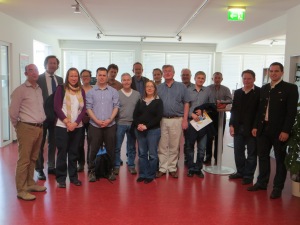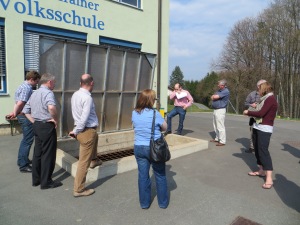BioPAD, an innovative bioenergy project led by the Western Development Commission, has completed a policy learning study tour to Austria with 16 partners, associates and policy makers. The tour, organised by Action Renewables in Northern Ireland, took 2 days and included 8 visits in Eastern Austria, each examining a different aspect of bioenergy use.
The study tour included a visit to the town of Güssing, which has transformed itself, over the last 15 years into a centre of excellence for the production of energy from local sources. The region of Burgenland, in which Güssing is situated, aims to source its energy requirements sustainably. It already has a biomass gasification plant producing electricity and heat, and a centralised district heating system. The town also hosts the European Centre for Renewable Energy, to share its research and experiences, which has added to the region’s knowledge and reputation and provided more local employment.
BioPAD (Bioenergy Proliferation and Deployment), led by Western Development Commission (Ireland), aims to develop new and effective bioenergy supply chains incorporating innovations in biomass fuels, supply chain logistics and conversion technologies. BioPAD is funded under the ERDF Interreg IVB Northern Periphery Programme and has partners in Scotland (Environmental Research Institute, UHI), Northern Ireland (Action Renewables) and Finland (Finnish Forest Research Institute, METLA). They are developing products and services to stimulate the use of bioenergy in areas of northern Europe.
The project aims to gain a better understanding of the current status of biomass supply chains for a range of biomass types including wood products, energy crops, and agricultural wastes. The participants visited a range of renewable energy sites, including biomass heating for a school, a farmer co-operative running a district heating system in Gneibing, and a local entrepreneur providing heat, both for his own horticultural glasshouses and also for local houses in the village of St Martin.
Over the last 30 years Austria has transformed itself from a country reliant on imported fossil fuels into one which now generates almost 60% of its energy requirement from indigenous sources. The BioPAD group benefitted from the opportunity to learn from the experiences gained during this transformation.
For further information please contact Dr Helen McHenry 00 353 86 605 3264 or comment here.


